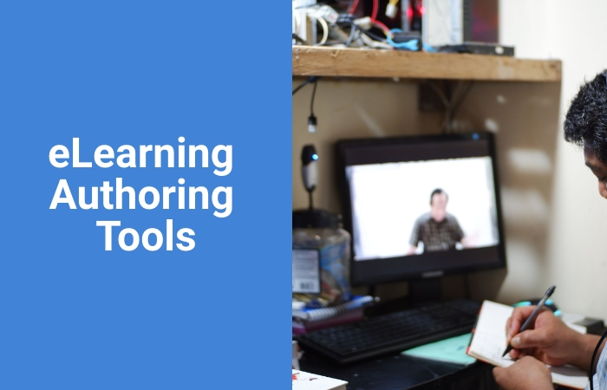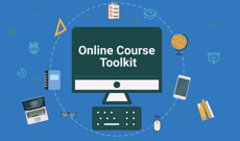The new ever-changing working landscape has made constant learning a new reality.
Luckily, eLearning is here to weave education straight into our lives. And it does a splendid job! Studies show that eLearning can be as effective as (if not more than) traditional classroom learning. It saves learners 40% to 60% of their time, facilitates lifelong learning practices, and equips people with tangible knowledge. Experiential learning in both higher education and professional environments has proven to be extremely effective. On top of that, eLearning is inclusive, interactive, personalized, mobile, and scalable.
And with new technology pushing forward and new challenges emerging daily, the influence of eLearning on the lives of both students and professionals will only keep growing. So, as an L&D specialist or an instructional designer, how can you create a learning environment that sets your learners up for success?
With the right tools, of course. Fortunately, there are numerous eLearning authoring tools on the market, free as well as high-end, that can help you craft effective and memorable learning experiences.
In this article, we’ll explore the various types of eLearning authoring tools, highlight some of the best options in each category, and discuss some trends as we head into 2026.
Quick Read
⭐ Why you need eLearning authoring tools: They let you manage and design courses, assess students, and hold classes via web conferencing and virtual classrooms.
💡 Things to consider when choosing the tools: Check how well they align with your goals, what type of interactive content they support, how easy it is to integrate new services with the existing ones, and how easy to use and accessible the tools are.
🚀 Top eLearning tools: There are numerous options on the market to fit every purpose and budget. The most widely used tools include LearnWorlds, iSpring, and Cornerstone for LMS; Udemy Business and EdCast for LXP; Canva, Camtasia, and FlippingBook for content creation; Adobe Connect and Microsoft Teams Education for holding online classes.
What Is an eLearning Authoring Tool?
Simply put, an eLearning authoring tool is an app that enables individuals, educators, trainers, and instructional designers to create and distribute engaging digital learning content. These tools include:
- online course management systems
- design and video editing apps
- quizzes
- assessments
- web conferencing software
- virtual classrooms
Why You Need eLearning Authoring Tools
Although online training can be conducted through Zoom conferences, PowerPoint presentations, and assignments completed in Google Docs, the digital space offers many more possibilities for a modern, interactive, and effective learning environment.
By taking advantage of learning platforms, video formats, automatic assessment, and progress-tracking tools, you will make your life as an educator easier while also bringing added value to your students.
Criteria for Selecting the Right eLearning Authoring Tools
Choosing the appropriate tool will depend on your specific needs and goals. However, here are a few things to consider so you can make an informed decision:
- Alignment with Your Educational Goals: Simply put, the tool should help students achieve their objectives most effectively.
- Content Variety: Does the tool support the content formats you need, such as video, quizzes, or interactive activities?
- Good User Experience: The tool should be easy to set up and use for both educators and learners, even those who aren’t tech-savvy.
- Accessibility: It’s important that everyone, including students with disabilities, can use the tool easily.
- Interactive Features: Interactivity is an important part of eLearning, making gamification, quizzes, and discussion forums a significant advantage.
- Integration Capabilities: Make sure the tool supports integration with existing systems, such as a current Learning Management System (LMS) and Single Sign-On (SSO).
- Compatibility: Check if the tool works on a variety of devices, including tablets and smartphones, as well as different operating systems.
- Scalability: The tool should grow with you and handle a larger number of users and greater volumes of content over time.
- Customization Options: Customization is important for maintaining brand image consistency and executing courses and programs exactly as your training plan requires.
- Training and Support: The support team should be available at least 24/5, and the tool’s documentation and resources should be well-structured, detailed, and helpful.
- Pricing Model: There are many pricing models, including one-time fees, subscriptions, and per-user pricing. Consider the one that fits your budget best.
Types of eLearning Authoring Tools
#1 Learning Management System (LMS)
If you have never heard about LMSs, the concept may sound intimidating at first.
In reality, it is simply an online space where teachers, trainers, or administrators can create and organize digital classes or training programs—think of it as a virtual school or training center. Your learners sign in to the platform, take courses, and access various learning content, such as lessons, videos, and assignments.
On top of helping you organize people and content in one place, an LMS also keeps track of your learners’ progress. This gives you a clearer view of your learning content strategy and insights into how well it is working.
So, if you are serious about eLearning, you will definitely need an LMS.
#2 Learning Experience Platform (LXP)
A Learning Experience Platform is a type of eLearning creation software designed to offer a personalized, social, and flexible learning experience. Sounds just like the LMSs we’ve just discussed, right?
Yes and no. Just like LMSs, LXPs allow users to create and curate content, and track learners' progress. However, the main difference lies in the focus. An LMS is typically more structured and caters to administrators, helping organizations ensure learners complete courses and meet any compliance needs.
In contrast, LXPs focus on enhancing the learner's experience, tailoring content to individual needs. They often employ artificial intelligence to personalize content just like how Netflix or Spotify would recommend movies or songs.
#3 Course Creation Tools
Course creation tools typically include design and digital publishing platforms, video editors, games, and survey and quiz creation apps. Many of the LMSs and LXPs we’ve looked at above come with built-in course creation features. But if you want to go beyond what they have to offer, there’s an abundance of great standalone content creation tools on the market.
#4 Web Conferencing Tools
In eLearning, platforms providing tools for virtual classrooms, webinars, and interactive learning sessions are essential. And while Zoom remains the go-to choice of many educators, there are some great alternatives on the market worth considering.
Top 20 eLearning Authoring Tools
LearnWorlds
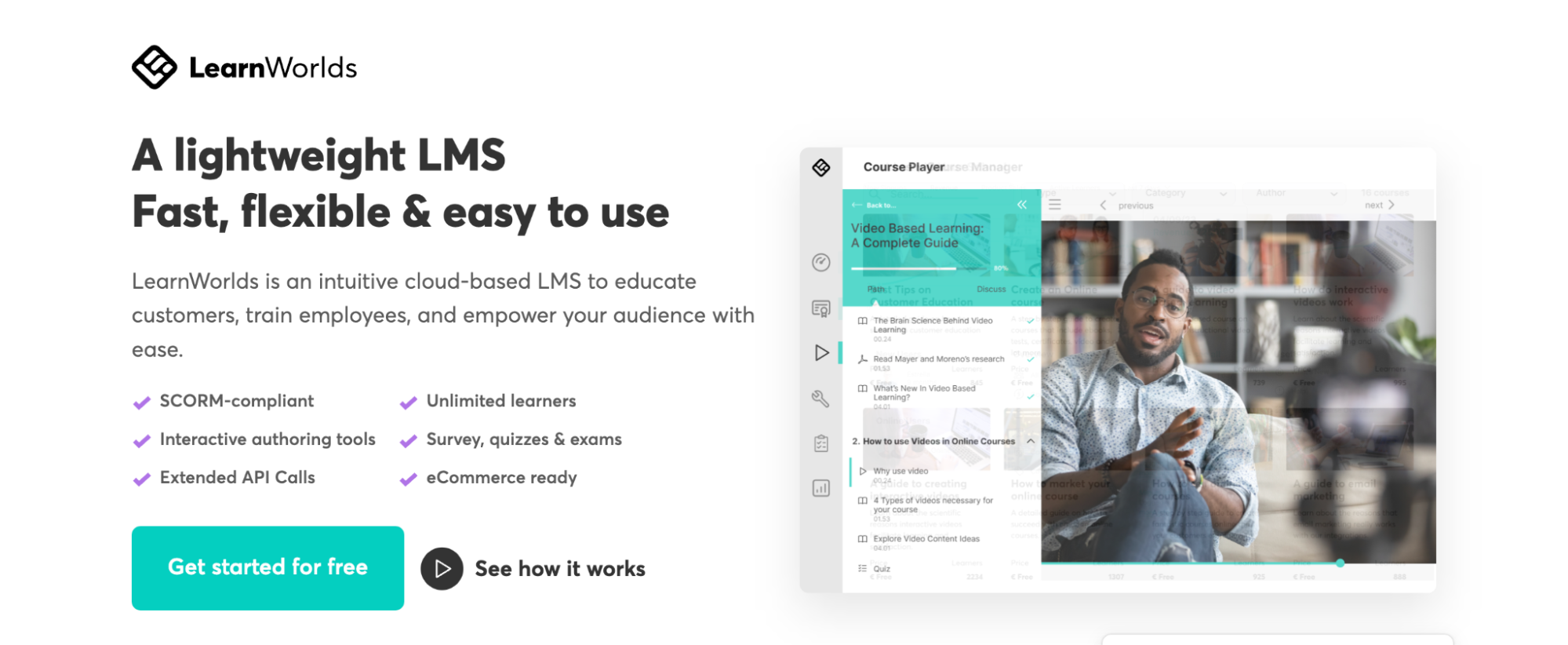
LearnWorlds is a business-oriented cloud-based platform, boasting many practical features of elearning software. Its flexibility and intuitive user interface make it an excellent choice for individual educators and large enterprises alike.
At its core, it lets you create and host educational content like interactive videos, ebooks, and assessments. What’s really great, though, is that you can sell your courses and materials directly through the platform. With so many other things to wrap your head around, having the payment process sorted out for you is invaluable.
Key features
- Interactive Video Creation: You can incorporate surveys and polls into your videos to keep learners engaged.
- Assessment Tools: Including surveys, quizzes, and exams.
- E-Commerce Tools: You can sell your products with a built-in payment processing feature.
- Integration: Connect to Direct Zoom, Webex, and Calendly for live sessions.
- API Access: Integrate various design and marketing tools into LearnWorld to simplify your daily work.
- Collaboration Tools: File and project-sharing features facilitate effective teamwork.
Type: Learning Management System
Pricing: starts at $24/month for the Starter plan. This includes unlimited paid courses, a custom domain, and all the essential integrations—making it quite a bargain.
iSpring Learn LMS
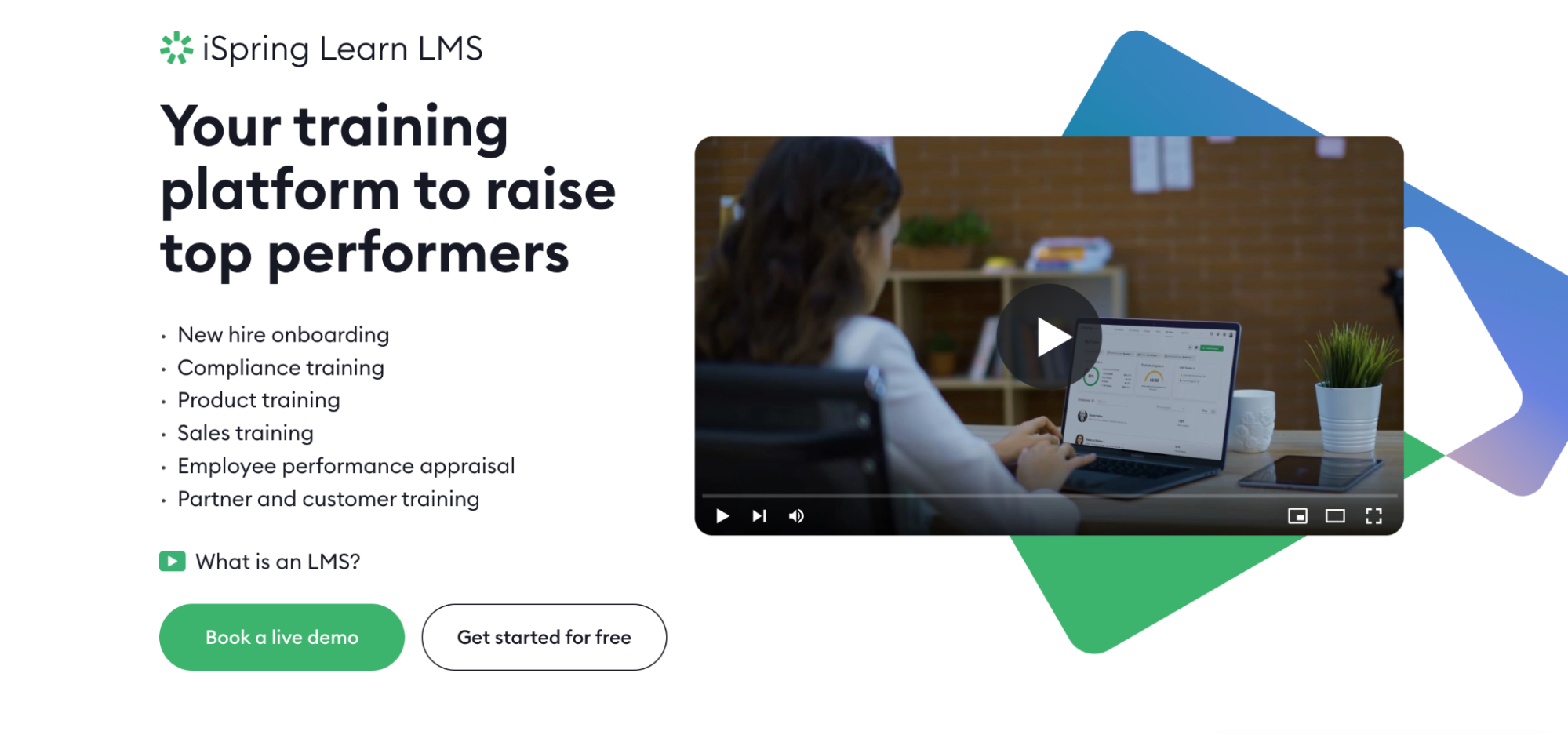
Much like LearnWorlds, iSpring Learn LMS is tailored to companies aiming to create a comfortable learning environment for their employees.
With a straightforward design, powerful course creation and management features, and top-notch reporting, it’s been recognized as one of the industry leaders. So, if you are looking for a proven and dependable solution, iSpring Learn is a sound choice.
However, keep in mind that the pricing may be a concern for smaller businesses. Plus, setting iSpring Learn for your company can require additional assistance and time. If you're a newcomer to eLearning, it might be worth considering other options.
Key features
- Course Authoring Tools: Interactive video lessons, assessments, and longreads.
- An Extensive Course Library: Hundreds of ready programs to choose from.
- In-Depth Reporting and Analytics: Monitor your learners’ performance and progress by tracking assessment completion and overall engagement.
- User Management: Assign specific roles to bring structure to your work and simplify the learning process management.
- Automated Training: This includes notifications, deadline reminders, and progress reports.
- iSpring Integration: Connect with iSpring Suite, another solution by iSpring that expands your content creation options significantly.
Type: Learning Management System
Pricing: starts at $149/month for 50 users. Please note that the cheapest plan doesn’t include a content library and API for integrations.
360Learning
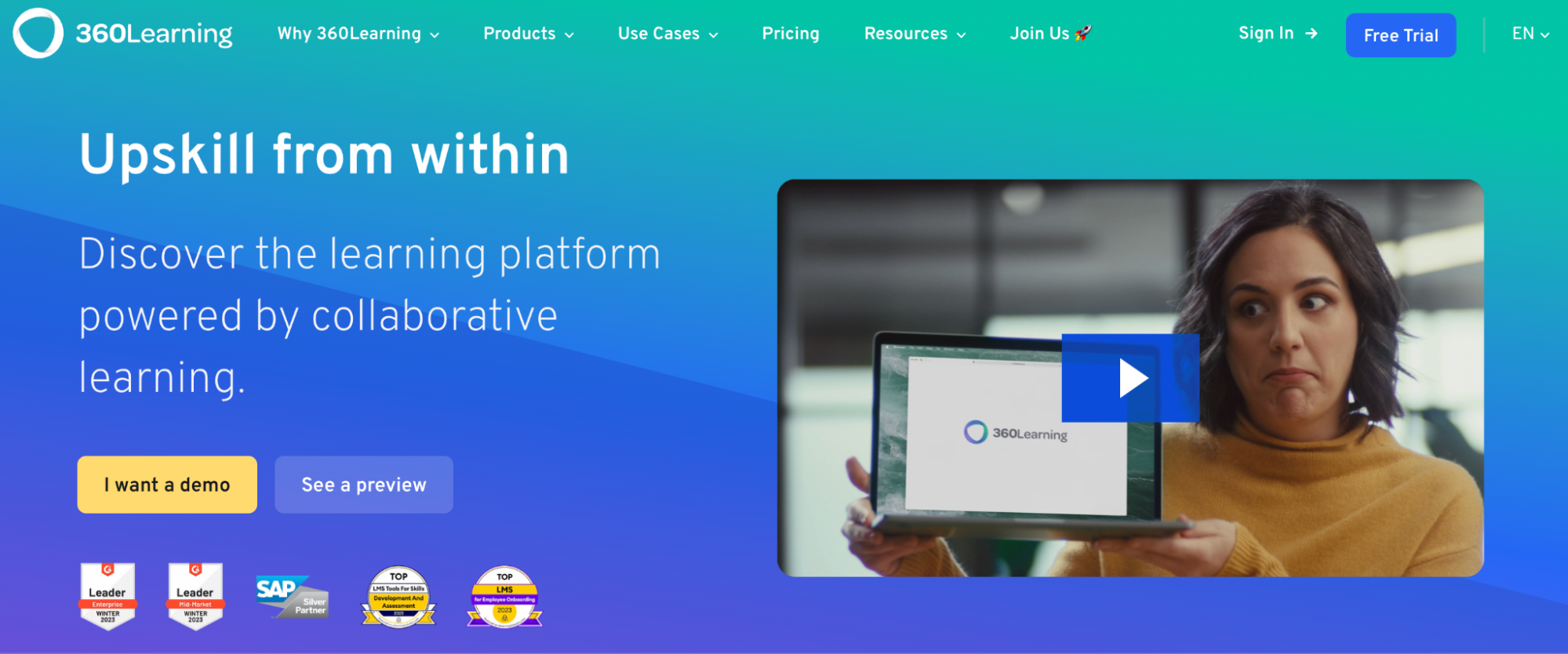
While many traditional LMSs cater to L&D specialists and instructional designers, the 360Learning approach focuses on collaborative learning. This means not only educators but also internal experts and peers can contribute to course creation. And 360Learning’s intuitive interface ensures everyone can master the platform in no time.
One of the best 360Learning features is “Learning paths”. A learning path outlines a set of skills and competencies that can be tailored to a learner’s specific role or career goal. This lets you, as an education provider, stay flexible and fast—adapting learning processes to tackle your team’s core challenges.
Key features
- Course Creation: You can create videos, presentations, quizzes, and documents.
- User-Generated Content: Encourage learners to share their knowledge and experiences.
- Collaborative Authoring: Work on course creation as a team to roll out new materials faster.
- Social Learning: Peer reviews and shared notes help foster a common learning environment.
- Analytics and Reporting: Track your learners’ progress and content performance.
- Integration: 360Learning offers dozens of ready-to-use integrations with design, learning, and workflow tools.
Type: Learning Management System
Pricing: starts at $8/month per user (5 users minimum).
Cornerstone

Cornerstone has been on the market for over two decades, establishing the company as a true expert in the field. For many, Cornerstone is the face of online learning. The years of experience are reflected in their products, too—Cornerstone provides solutions and services for digital and hybrid education, enterprise training, recruiting, and performance analytics.
This online eLearning software may not be very easy to adopt, but once you master it, it can handle an array of people management tasks. It’s an excellent choice for middle-sized companies and enterprises aiming to make the lives of their HRs and L&Ds easier.
Key features
- Content Creation: Design courses using videos, documents, and external resources.
- Personalized Learning: Provides content, specifically curated to cater to individual preferences and needs.
- Mobile Learning: Accessible through the Cornerstone app or a branded mobile app.
- Analytics and Reporting: Make data-driven decisions about your training programs.
- Social Learning: Cornerstone supports peer-to-peer learning and collaboration via peer reviews.
- E-Commerce Integration: Monetize courses and subscriptions by selling them directly on the platform.
Type: Learning Management System
Pricing: by request.
TalentLMS
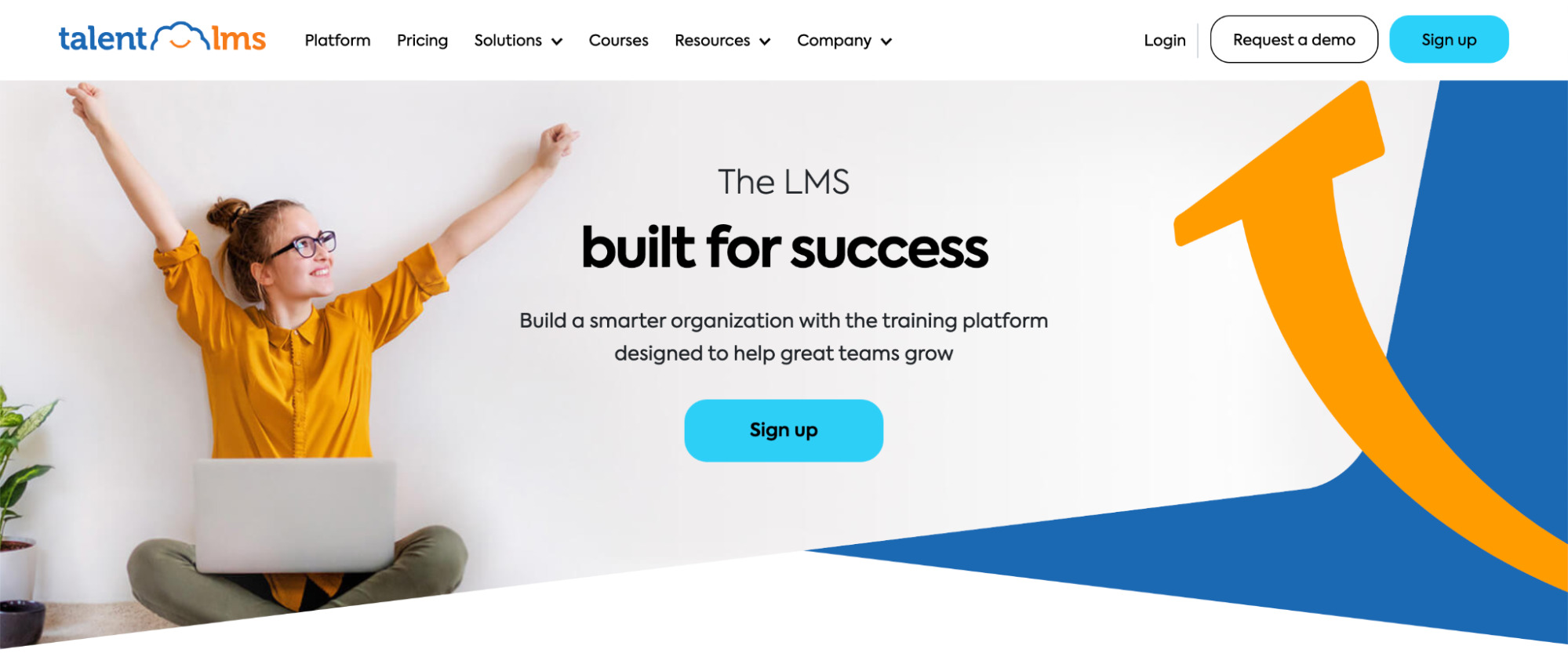
TalentLMS is an online learning platform that’s ready to be used right out of the box. The best part about it is that, unlike some other solutions on the list that take months to adopt and adapt to, it can be deployed in a week—bringing value to your company here and now.
It’s also highly scalable, catering to businesses of all sizes. So, even if you are a large enterprise aiming to kickstart your team’s education, TalentLMS is the tool for you, too.
On the downside, however, TalentLMS’s customization options are a bit limited. Some users have also noted problems with reporting and pointed out that the analytics are not as comprehensive as those provided by other platforms.
Key features
- Course Creation: Incorporating video, documents, and external resources.
- Mobile Learning: Provide on-the-go course access via TalentLMS’s mobile app.
- Customization and Branding: Give your courses a professional look & feel.
- Assessments & Surveys: Evaluate learner progress and gather feedback.
- E-Commerce Tools: Monetize your courses through built-in commerce features.
- Integration: TalentLMS connects with a wide range of business tools, such as Zoom, Paypal, and Salesforce.
Type: Learning Management System
Pricing: starts at $69/month (for up to 40 users).
Udemy Business
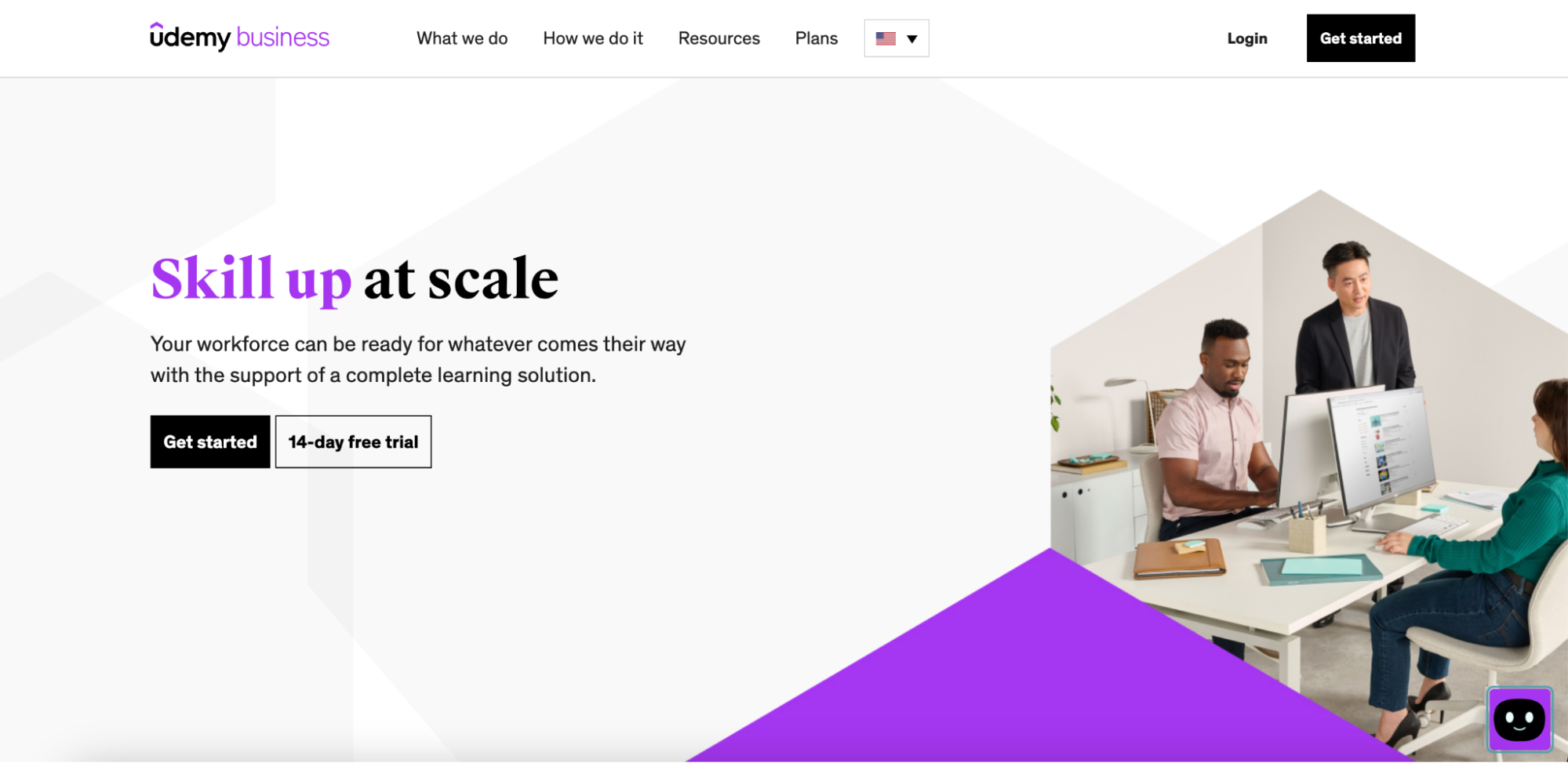
Udemy Business is essentially a course marketplace offering thousands of programs to choose from. Both small businesses and large organizations can find relevant, on-demand content tailored to their specific needs. This enables them to start educating their employees in days rather than months.
With Udemy, you can find a course or a set of courses perfect for your team, whether it’s technical skills, language learning, or leadership training.
Key features
- Course Collection: Over 5,000+ curated programs focusing on key business and technical skills.
- Learning Paths: Customized training programs designed to help employees achieve specific learning goals or job roles.
- Integration: Link Udemy with LMSs and LXPs as well as other popular business tools.
- Reporting and Analytics: Track team progress and course completion rates, and identify the most engaged learners or popular courses.
- Mobile & Offline Learning: Ensures comfortable on-the-go access to course materials.
Type: Learning Experience Platform
Pricing: starts at $360/year per user.
Degreed

Degreed is a learning experience platform aiming to provide learners with next-level personalization. It serves as a hub for all relevant educational content, including videos, courses, podcasts, TED talks, and more. Another thing that Degreed does right is encouraging people to learn by assigning them real-life projects. Everybody has a unique way of learning, and Degreed takes this into account, ensuring learners acquire new skills in the most effective and engaging manner.
However, while having access to a variety of resources is a plus, for some learners it can be overwhelming. They might find it challenging to determine where to begin or what to prioritize.
Also, it’s worth noting that Degreed’s pricing targets mid-sized companies and large corporations, and may not be affordable for start-ups and small businesses.
Key features
- Content Integration: Degreed aggregates both external content (YouTube, podcasts, MOOCs) and custom-made courses.
- Learning Pathways: Degreed-curated or custom selections of content centered around specific skills, topics, or roles.
- Skill Ratings: Employees can self-assess their skills, allowing for an individualized view of their own learning and areas of growth.
- Analytics and Reporting: Track user engagement, skill development, and content efficacy.
Mobile Learning: Available via the Degreed mobile app.
Type: Learning Experience Platform
Pricing: free for individuals; for businesses, the pricing is by request.
SC Training (formerly, EdApp)
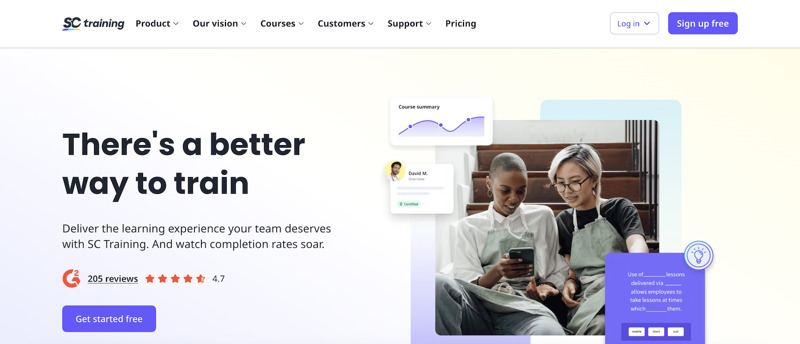
At its core, SC Training does the same job as other LXPs. It provides access to an impressive selection of ready-made courses and gives a set of creator tools for rapid content production. Collaboration, user and content management, and branding are supported as well, making SC Training an excellent tool for building a quality course even without any design or coding experience.
It also leverages artificial intelligence to assist in course creation—perfect for times when you’ve hit a creative block or just want to speed things up. So, if you are looking for something fast, flexible, and modern, SC Training might be just the platform for you.
On top of everything else, SC Training’s pricing is competitive compared to some other options on the market. With essential features offered on the free plan, SC Training is an ideal low-investment option to get you started in eLearning.
Key features
- Course Library: 1,000+ free courses to get you started.
- Course Creation Tools: 80,000+ templates for creating lessons, videos, quizzes, games, and assessments.
- Admin Portal: Get relevant reports and analytics, and manage users and content.
- Microlearning and Mobile Learning: Offers bite-sized content for on-the-go learning, fighting short attention spans and boosting motivation.
- Integration: EdApp integrates with numerous LMSs, course creation, and marketing tools.
Type: Learning Experience Platform
Pricing: offers a free plan, paid plans start at $2.95/month per user.
EdCast
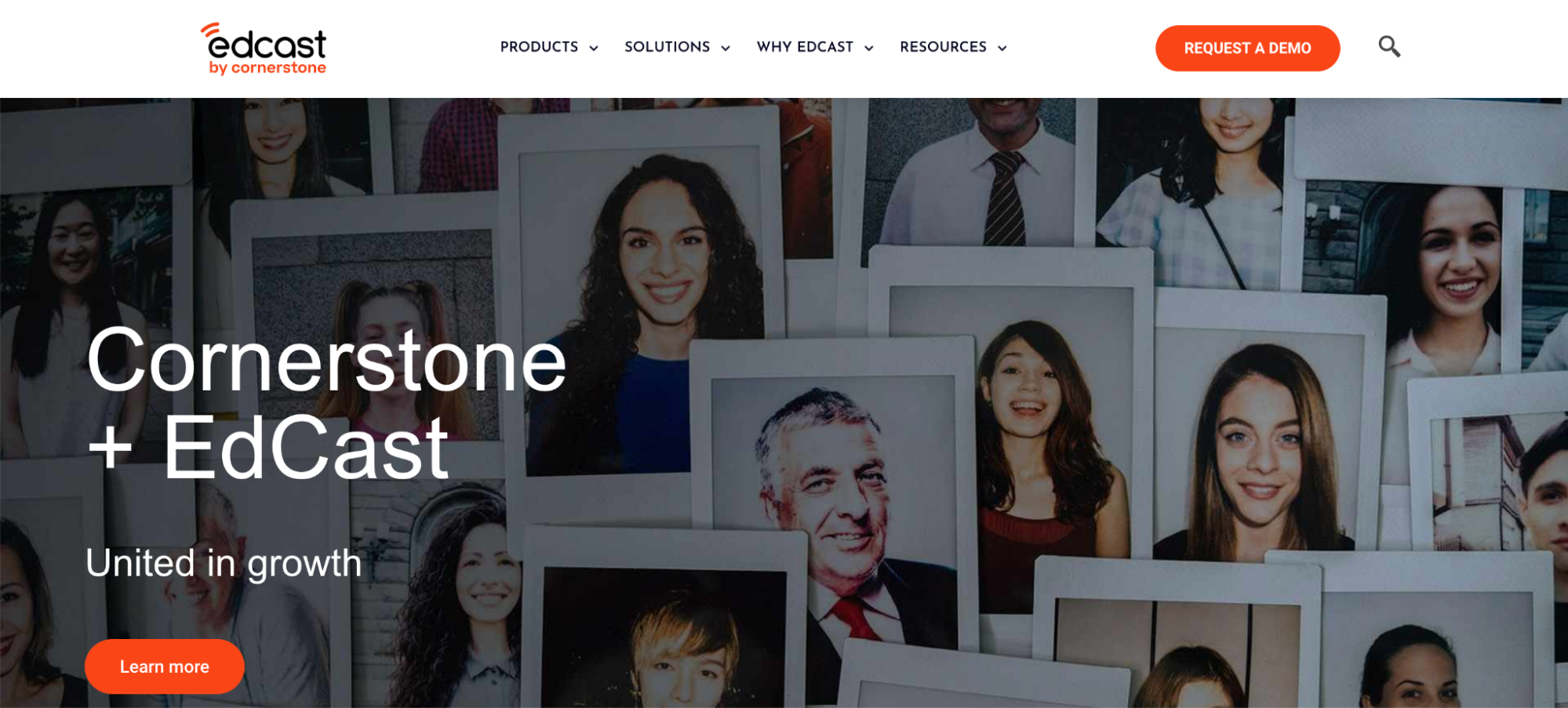
This learning experience platform is owned by Cornerstone. Naturally, it works seamlessly with their LMS, but can also be used as a standalone tool.
EdCast offers the same basic features as other LXPs: an extensive selection of high-quality, curated content, progress tracking, and learning paths for tailored learning experiences.
One thing they do exceptionally well is creating contextualized educational content based on the tasks that the learner undertakes. To do that, EdCast uses AI to access external content from your LMS and shared repositories, ensuring that the learning materials are relevant.
While there aren’t many drawbacks, as with many content-rich solutions, the number of options can be overwhelming for newcomers. Also, some users feel that the platform’s interface has a bit of a learning curve.
Key features
- Content Aggregation: EdCast hosts a course marketplace full of diverse, carefully chosen, and high-quality learning materials.
- Social Learning: Encouraged via collaboration, shared insights, and active participation.
- AI-Powered Recommendations: Suggests curated learning materials in alignment with the learner’s individual needs.
- Integration: Connects to various other platforms and tools for a comfortable workflow.
- Scalability: EdCast adapts and grows with your company, meeting your evolving needs.
Type: Learning Experience Platform
Pricing: by request.
Learn Amp
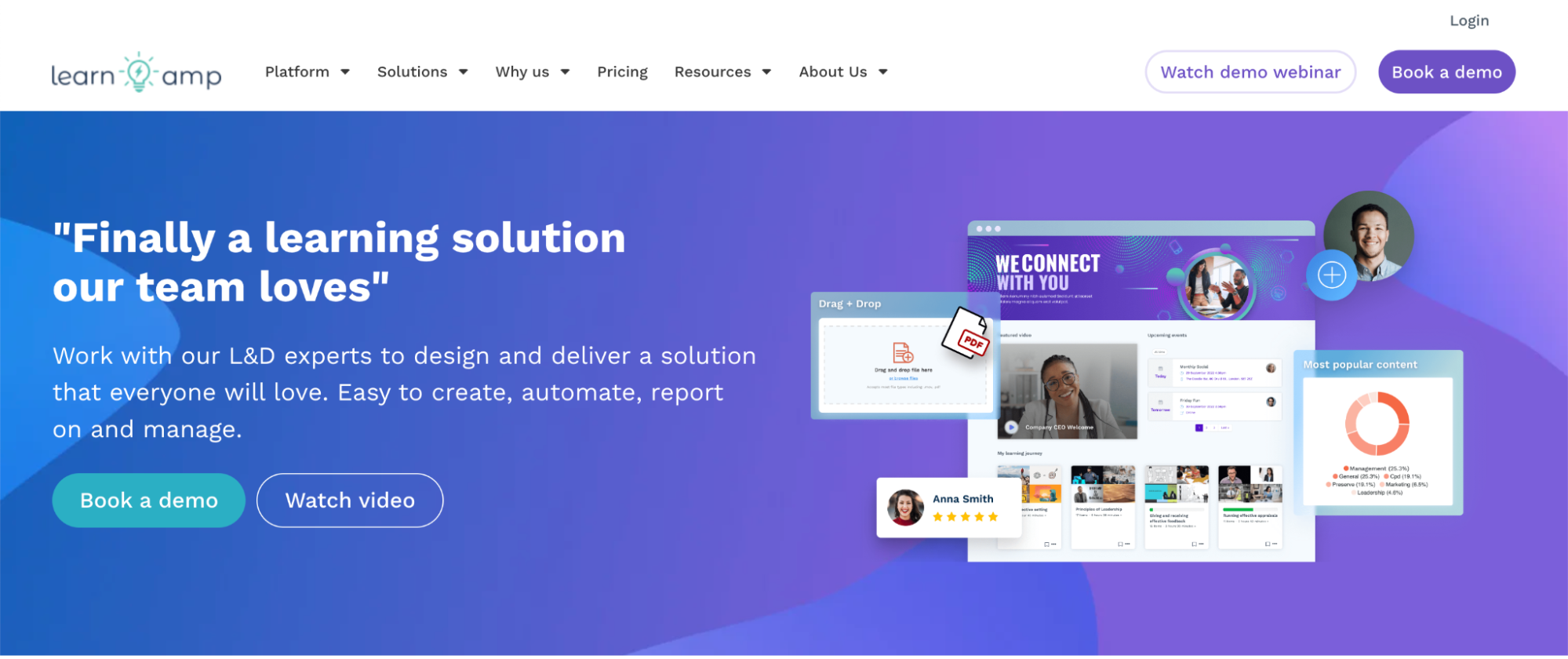
In Learn Amp’s own words, it’s a flexible LXP best suited for mid-sized to large companies. Its aim is to help you build a democratic, decentralized, and personalized learning environment within your growing organization.
What’s great about Learn Amp is that it combines features of both an LMS and an LXP. So, on one hand, you can access a library of valuable content (such as LinkedIn Learning, Udemy, and Skillshub), create your own content, and design custom learning paths. On the other hand, L&D specialists and managers can use Learn Amp to organize the content most effectively and enjoy in-depth analytics.
However, some users have noted that Learn Amp reporting is a bit rigid, and the interface might take time to get used to. So that’s something you might want to consider when trying out the platform.
Key features
- Content Library: Articles, videos, and full-blown courses.
- Engagement Surveys and Well-Being Tools: Keep a finger on the pulse of employee satisfaction and mental well-being.
- Social Learning: Encourages users to engage in discussions and collaborate on projects, promoting a culture of shared knowledge and peer-to-peer learning.
- Custom Learning Paths: Tailor your training programs to different roles or goals.
- Performance Reviews: Set goals, collect feedback, and track your learner’s progress to ensure your learning process is clear and effective.
Type: Learning Experience Platform
Pricing: by request.
Exam-Labs
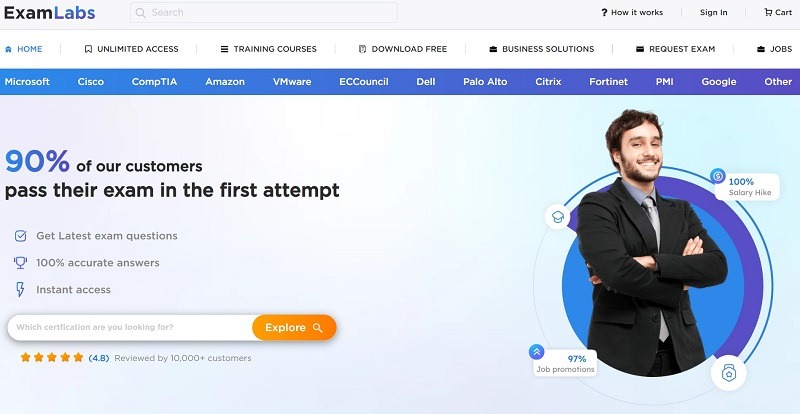
Exam-Labs stands out as a platform for those preparing for certification exams, especially in the IT domain. It offers unlimited access to various exams, making it a useful resource for people aiming to enhance their technical skills and achieve professional certification.
With Exam-Labs, users can access an extensive array of practice tests, study guides, and VCE files. All this provides the learners with a realistic preparation experience. However, some users mention that they need to pay extra for the simulator software to use the tests.
Key features:
- Extensive Exam Database: Offers a wide range of practice exams for popular certifications from vendors like Microsoft, Cisco, CompTIA, and more.
- Expert-Verified Answers: Each practice question is accompanied by detailed explanations and verified by industry professionals, ensuring high-quality learning material.
- Customizable Learning Experience: Learners can tailor their study sessions based on their strengths and weaknesses, focusing on areas that require additional practice.
- Community Support: Access to a community of fellow learners and certified professionals, providing a platform for discussion, tips, and shared learning experiences.
Type: Learning Experience Platform
Pricing: the price varies for different courses.
Canva

Canva hardly needs an introduction, as it’s long since become everyone’s go-to tool for various design tasks. For those unfamiliar with it, Canva is a powerful design app for crafting documents, presentations, videos, images for social media, and other digital content.
The tool boasts a massive template library, animations, and an intuitive editor. But what probably makes Canva so popular is how easy it is to use even for non-designers. The basics can be grasped within minutes, and the learning curve for more sophisticated features is not that steep.
Canva offers a free plan, sufficient for the majority of basic design tasks, but their Pro plan enhances your design experience.
Key features
- Drag-And-Drop Editor: Simply drag elements onto your canvas; no advanced graphic skills required.
- Customizable Templates: There’s something for any design need—from social media posts and presentations to infographics and business cards.
- Element Library: Images, fonts, icons, shapes, and even videos.
- Collaboration Tools: Share designs, leave comments, and make real-time edits.
- Integration: Canva integrates with hundreds of design, marketing, and LMS tools, streamlining your content creation process.
Type: Course Creation Tool
Pricing: offers a free plan, paid plans start at $12.99/month
Camtasia
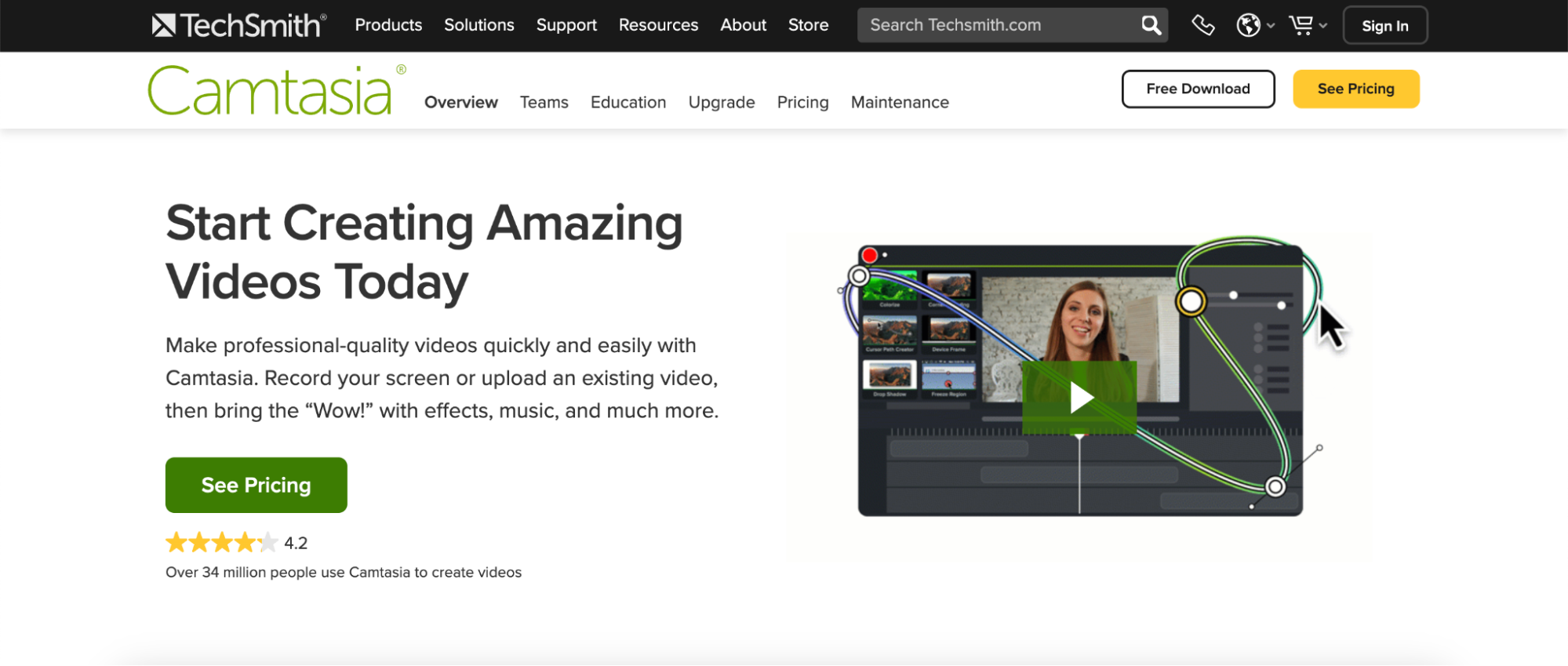
Camtasia is like Canva for videos. It’s one of the simplest and most reliable video editors and screen recorders out there that anyone can master. With extensive template and assets libraries, as well as engaging animations, even a beginner will be able to create an interactive video in just a few hours.
However, while it’s easy to use and great for beginner and intermediate video editors, professionals may find the editing options a bit limited. So if video editing is your forte, you might want to look for more powerful software. But if that’s the case—hey, you probably don’t need our advice on this one!
Key features
- Screen Recording: Capture your screen, camera, and microphone to craft professional videos.
- Video Editing: Combine or split clips, trim, and speed up or slow down footage.
- Annotations & Callouts: Highlight specific parts of the video with a variety of shapes, arrows, and text boxes.
- Interactive Elements: Embed quizzes, clickable links, or other interactive hotspots.
- Library of Assets: Camtasia provides a collection of free music, animations, icons, and motion graphics, speeding up the video production process by a great margin.
Type: Course Creation Tool
Pricing: $299 for a perpetual license.
Movavi Screen Recorder
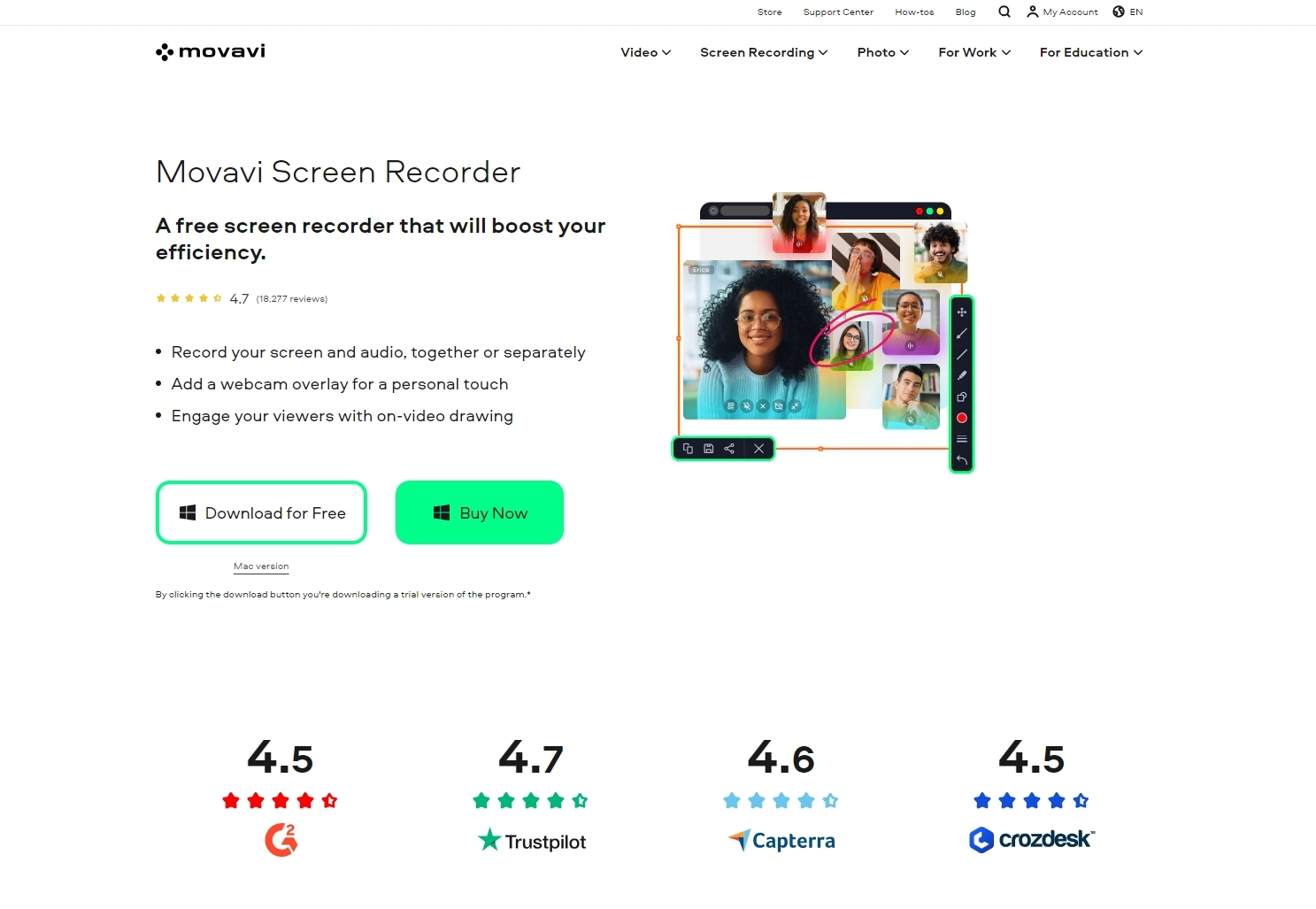
Want to be able to record any webinar, podcast, or presentation even while you’re away from your Mac device? With Movavi Screen Recorder, this is possible. Thanks to its scheduler functionality, Movavi’s Mac free screen recorder can capture online events for you even if you can’t attend them. You can grab your entire screen or just a portion of it, record audio from your speakers or your mic, draw on videos in real time, and more.
As you can see, Movavi Screen Recorder is a very helpful tool for e-learners. After capturing your screen and audio, it also can convert the resulting footage to any popular video format or MP3 if you’re recording a lecture or a podcast. Try this free screen recorder for Mac to boost your e-learning experience.
Key features
- Screen recording: grab anything on your screen in HD and 4K – presentations and online lessons included.
- Audio recording: capture sound from your speakers and mic.
- Annotation tools: take screenshots and annotate them with shapes and arrows; draw on videos in real time and add text.
- Video editing: offers basic video-editing tools to delete unwanted parts from the video.
- Schedule your recording sessions: record any online event without attending it.
Type: Video Creation Tool
Pricing: free, 1-year subscription for $42.95
FlippingBook
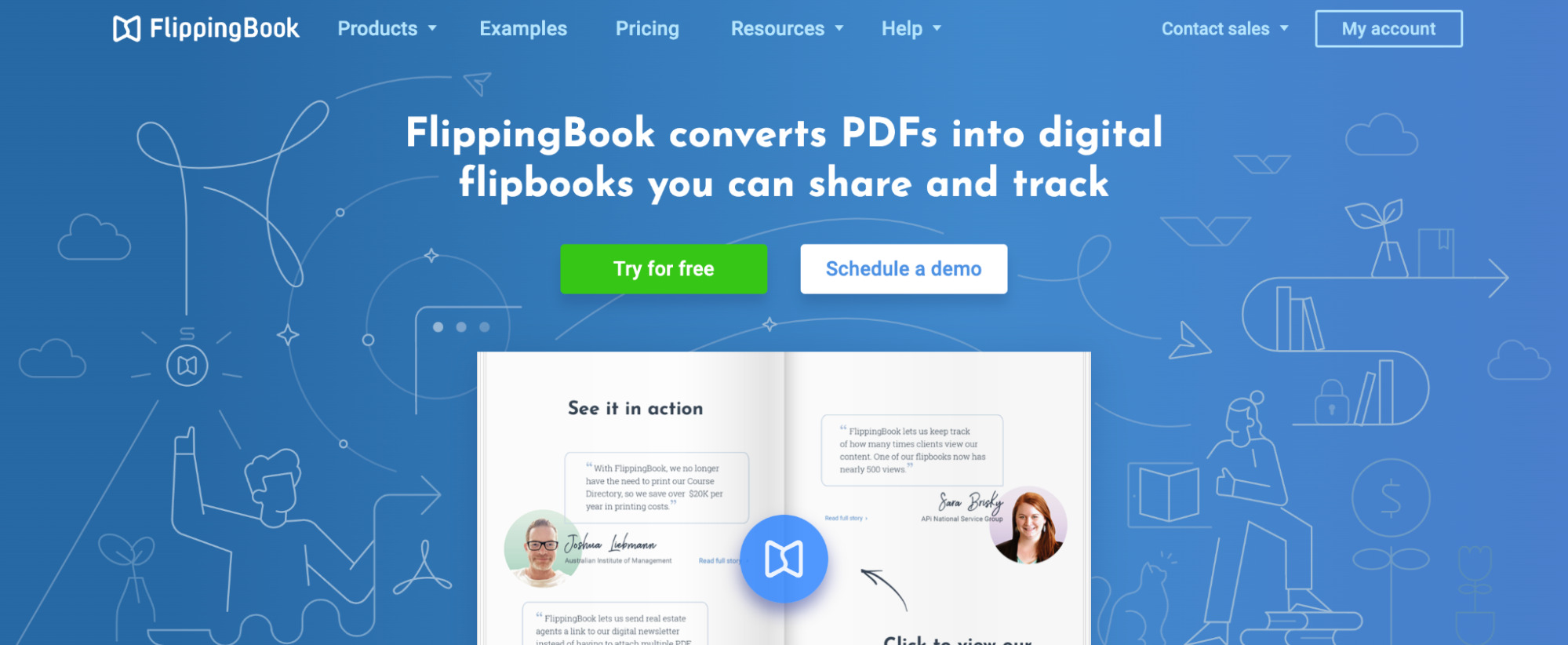
No course is complete without textbooks, workbooks, presentations, and guides. FlippingBook helps you share these and other educational resources as interactive flipbooks. It’s a powerful, easy-to-use publishing tool that converts PDFs into HTML5-powered documents. The documents can be then shared as links or embedded into a website, allowing learners to view them right in the browser—perfect for learning on the go.
In addition to being easier to share and view, documents created with FlippingBook can be enhanced with extra content: videos, links, GIFs, pop-ups, and image galleries. Some studies suggest that interactive content can boost the educational experience and increase learners’ engagement by up to 50%. And FlippingBook presents a fantastic opportunity to make your materials more fun and effective (while providing a few extra perks). What's more, FlippingBook allows you to add fillable forms and quizzes that help crafting interactive coursebooks and workbooks for your students.
According to FlippingBook's research:
- 44% of flipbooks with interactive educational content are viewed for more than one minute, compared to 30% without interactivity.
- 54% of interactive flipbooks are viewed beyond the halfway point.
Key features
- Easy Sharing: Share your text-based materials as links or embeds that open on any device, directly in a browser.
- Interactivity: Embedding of video, GIF, link, pop-up image gallery, forms and quizzes is supported.
- Content Tracking: Measure your content effectiveness with in-depth analytics.
- Collaboration & Management: Keep all content in one place, organized into private and shared folders.
- Content Protection: Unlist materials from search engines, protect with passwords, or share securely as protected embeds that work only within your website.
Type: Content Creation Tool
Pricing: offers a 14-day trial, paid plans start at $26/month.
Vyond
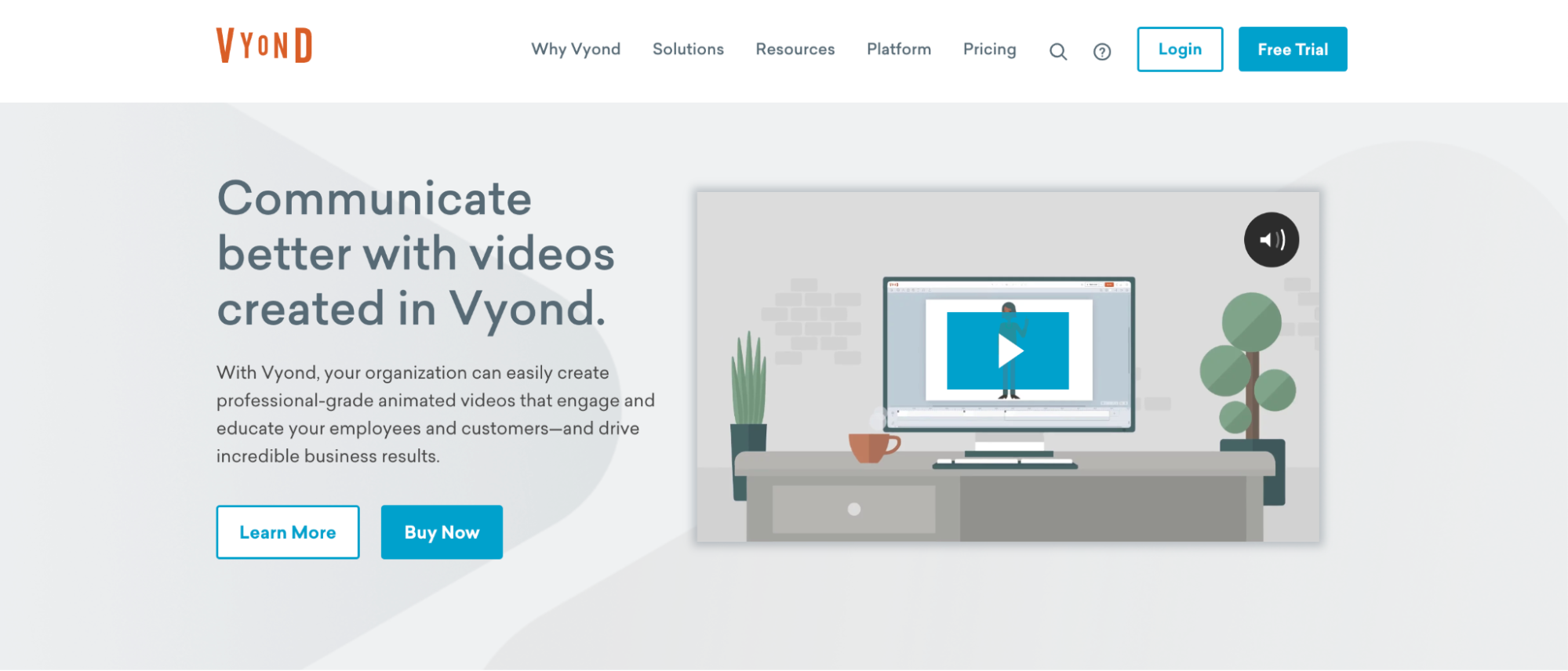
Vyond isn’t your typical video creation software. Instead of simply allowing you to record and edit screencasts, it gives you the opportunity to craft fully animated videos. Video content like this is perfect for training courses and explainer videos since it’s both eye-catching and engaging.
Vyond also offers templates and an extensive library of assets, making video creation easy even for people with no design or animation background.
The tool’s only downside is perhaps that it is cloud-based and depends on a steady Internet connection to render your videos.
Key features
- Templates: A range of customizable templates tailored for various industries and use cases, including eLearning.
- Character Customization: Users can create and customize characters, and also use AI to generate characters from photos.
- Rich Media Library: Props, backgrounds, and sound effects for more dynamic and engaging videos.
- Collaboration: Shared spaces and libraries make teamwork a breeze, and role assignments simplify management.
- Branding: Reflect your corporate identity through your logo and other branding elements.
Type: Video Creation Tool
Pricing: offers a free 14-day trial, paid plans start at $25/month.
Quizizz
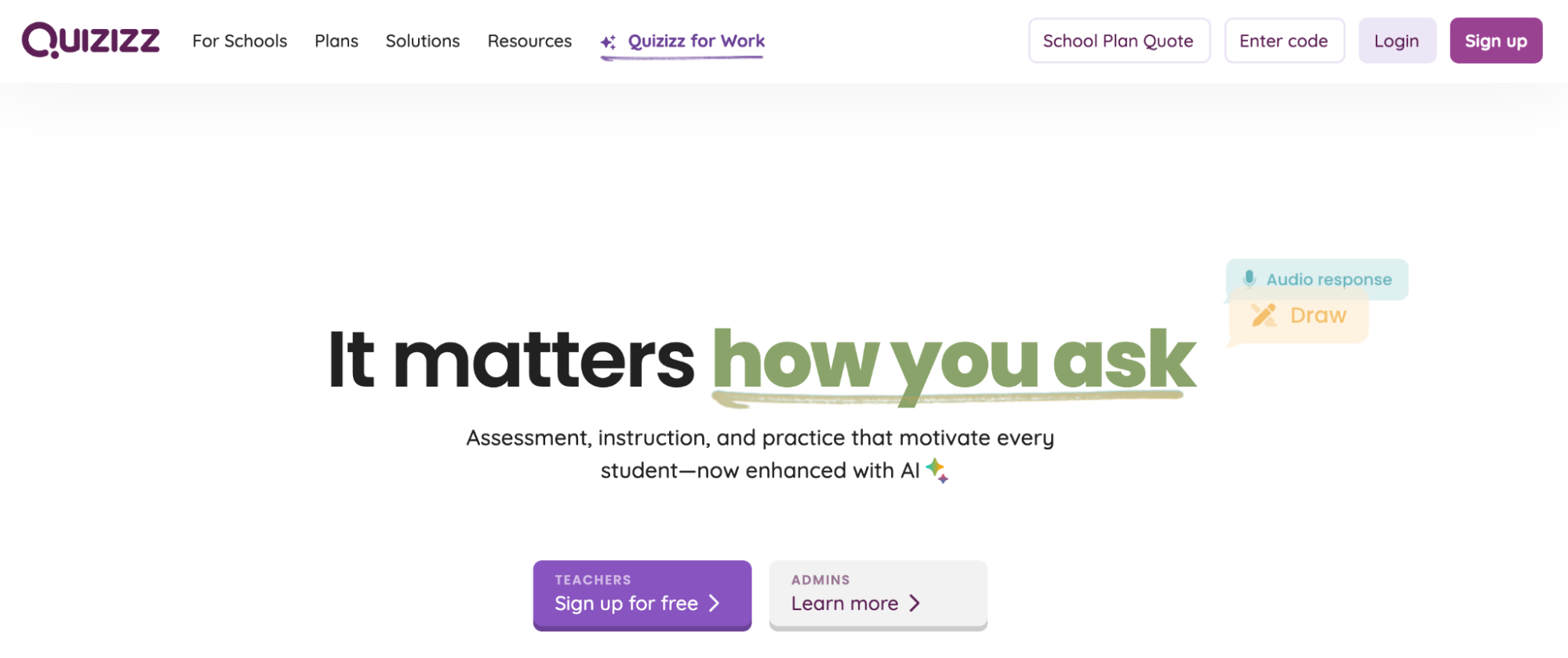
As you can guess from its name, Quizizz is a quiz-building platform. But it’s much more than that. This authoring tool for elearning allows you to create lessons and slides on top of quizzes, making them engaging and fun. To enhance the learning process, Quizizz leverages interactivity, gamification, micro-learning, and the power of AI. These features align with the hottest eLearning trends, ensuring Quizizz is future-proof.
And you don’t have to start from scratch, thanks to the tool’s extensive template library. Just select a ready-made quiz and customize it, saving hours of work.
Key features
- Content Library: Over 30M+ teacher-created activities, covering all grade levels and subjects.
- Powerful Content Creation Tools: There are multiple question types, interactive lessons, and more.
- Gamification: Leaderboards, themes, redemption questions, and power-ups to spark learners’ motivation.
- In-Depth Analytics: Get valuable insights for student assessments and further content improvement.
- Mobile Learning: Allows learners to access bite-sized lessons on the go.
Type: Course Creation Tool
Pricing: Quizizz offers different pricing options for schools, districts, and businesses. There’s a free plan, and paid plans start at $19/month (for individual trainers).
Edpuzzle
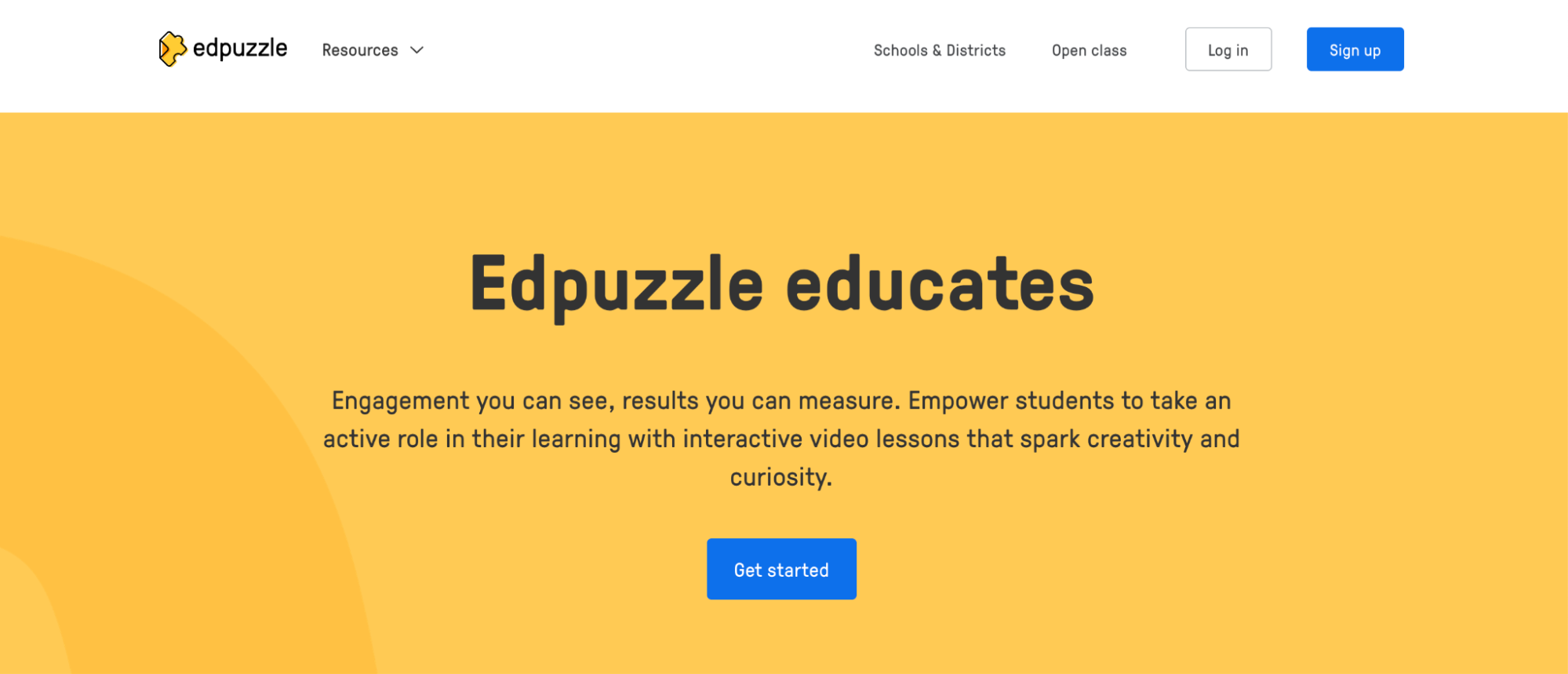
Edpuzzle is yet another video creator on this list of elearning authoring software, but it is simply too good to skip. Designed specifically for eLearning, Edpuzzle allows you to create truly interactive videos, gives access to a vast library of ready-made lessons, and provides statistics for data-driven insights on learners’ success.
In addition, you can use it as a screen-recording tool, which rightly makes Edpuzzle one of the top content-creation software for education purposes.
The only concerns are its learning curve—those who aren’t tech-savvy might need more time to get the hang of the platform—and some limitations of the free plan, such as restricted storage and video length.
Key features
- Video Customization: Edpuzzle allows you to take videos from platforms like YouTube, Khan Academy, and others, and customize them to meet various teaching needs.
- Embedded Questions: Embed questions directly into videos, transforming passive watching into an interactive learning session.
- Voice-over & Audio Notes: Add voice-overs to videos, providing personalized explanations or emphasizing specific points.
- Real-Time Progress Tracking: Get real-time analytics on how learners engage with the video content.
- Integration with Learning Management Systems (LMS): Edpuzzle seamlessly integrates with many popular LMS and business platforms, including Google Classroom, Canvas, and Microsoft Teams.
Type: Course Creation Tool
Pricing: offers a free plan, paid plans start at $13.50/month.
ChatGPT

The introduction of artificial intelligence signified a major shift in various spheres of our lives, including education. While there’s a lot of hype surrounding it, looking closely reveals the truly exciting opportunities that AI tools offer.
ChatGPT, for example, is much more than just a writing enhancement tool—it has the potential to benefit the lives of educators in many ways.
Ideas and suggestions
- Interactive Content Creation: You can use ChatGPT to design interactive modules based on simulated dialogs and scenarios, create interactive stories, or have ChatGPT act as an assistant through guided exploration.
- Learning Assessments: You can create adaptive tests and open-ended questions, or let ChatGPT provide real-time feedback to students, pointing out areas of improvement.
- Integration into LMS: Within an LMS platform, ChatGPT can enhance the learning experience by offering on-the-spot clarifications, suggesting reading resources, or even providing initial tech support.
Type: Content Creation Tool
Pricing: ChatGPT offers a free plan that is sufficient for most content creation tasks. The pricing for the Enterprise version is available upon request.
Adobe Connect
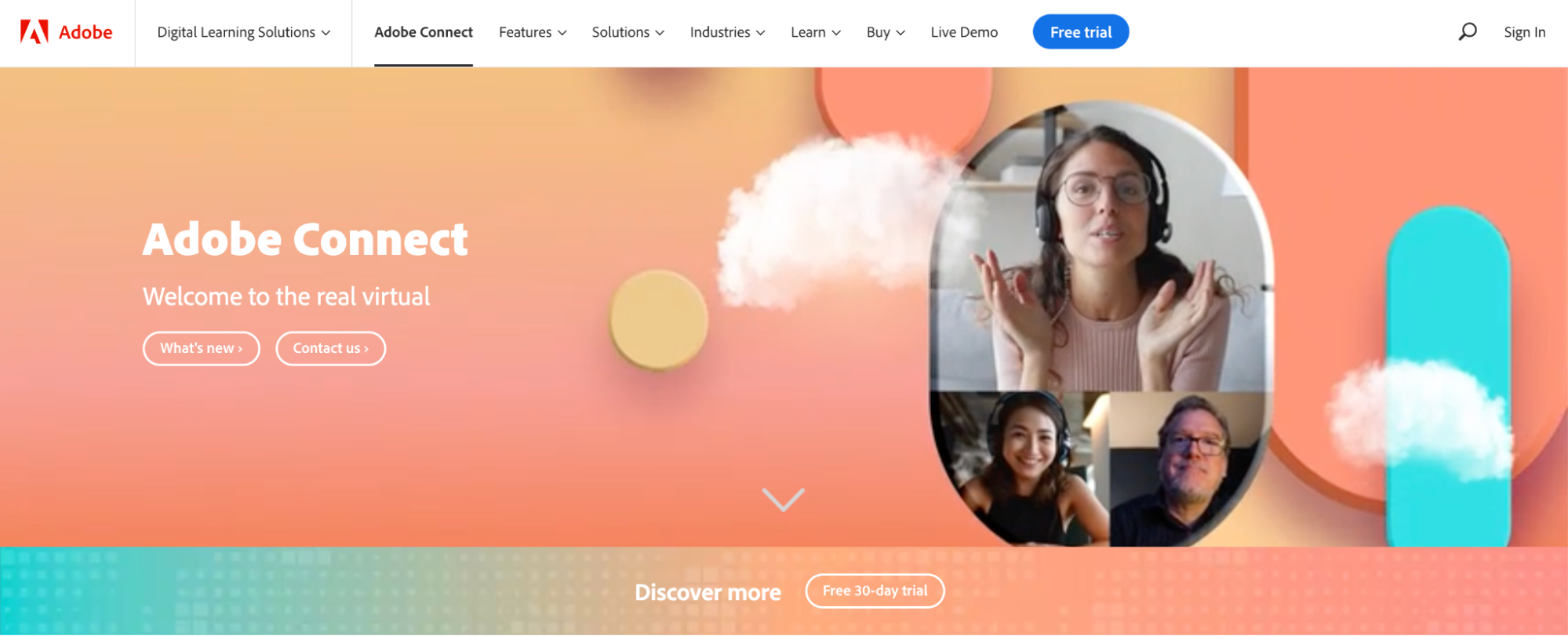
Adobe Connect stands out as a powerful and highly customizable platform, which means you can easily adapt it to your specific needs. With an impressive range of features, it allows you to create immersive virtual experiences, curated content, and engaging presentations, ensuring every class is not just another session, but an impactful event.
Praised for its high security and integration capabilities, Adobe Connect is a solid choice for both large companies and educational institutions. For smaller teams that are just starting out, it may feel too overwhelming though.
Key features
- Customizable Virtual Rooms: You can design unique virtual spaces with customized layouts, ensuring consistent branding and user experience.
- Interactive Content Integration: Incorporate videos, documents, and interactive objects into your sessions.
- Breakout Rooms: Encourage group discussions by splitting participants into smaller breakout rooms.
- Mobile Access: Participants can join sessions from any device with the Adobe Connect mobile app.
- Advanced Analytics: Get insights into participant engagement, attendance, and performance to fine-tune future sessions.
Type: Video Conferencing Software
Pricing: offers a free trial, and paid plans start at $190/year per host. However, keep in mind that add-ons, including LMS integration, reporting, and custom branding, can cost another $600/year.
Class
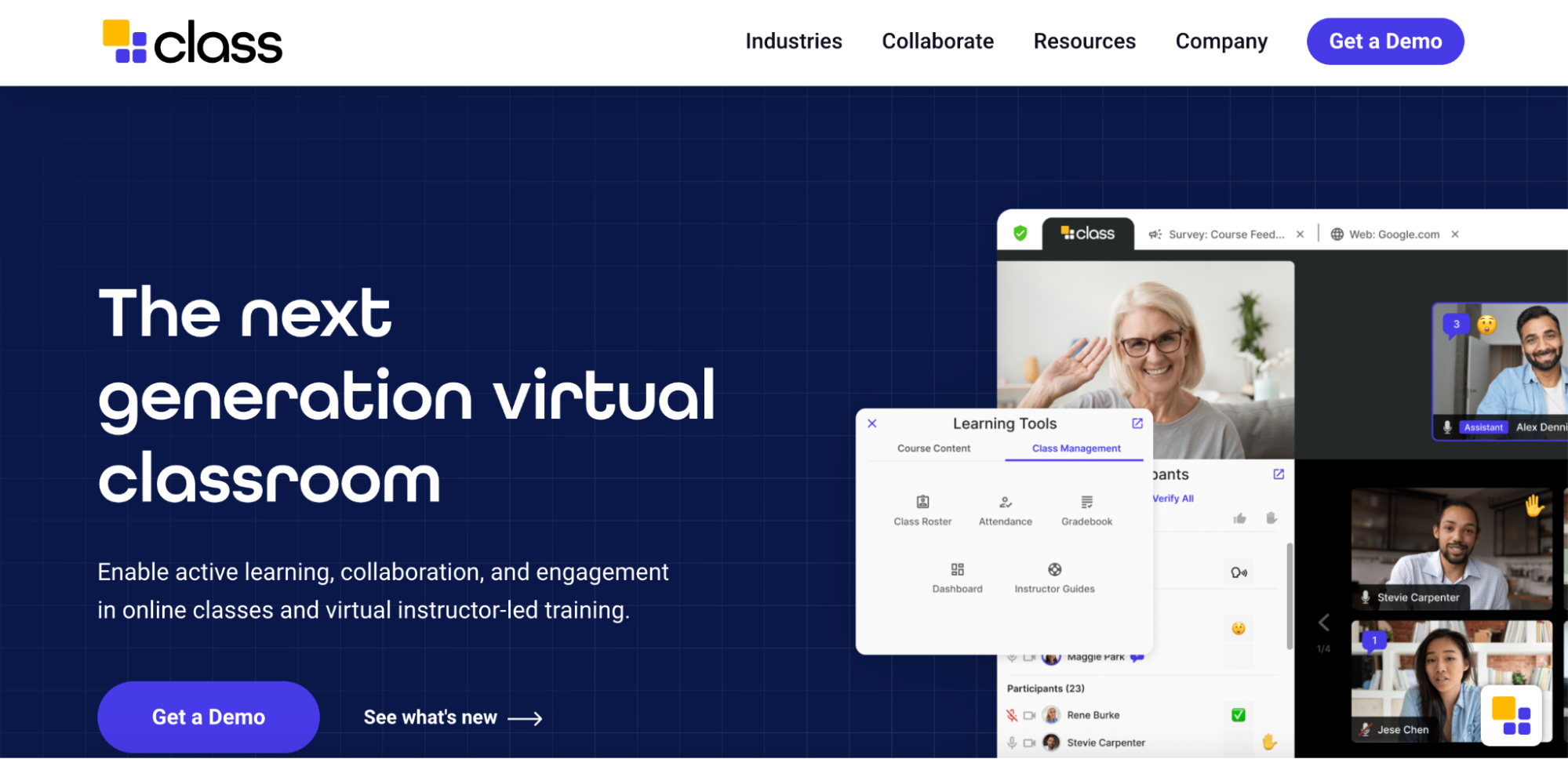
Class is a powerful platform that combines the features of web conferencing software with a virtual classroom. It’s built on Zoom Meetings but has been working well for educators with dozens of teaching and learning tools. Its main focus is learner engagement, which Class strives to improve by leveraging whiteboards, reactions, polls and quizzes, file sharing, engagement tracking, and other helpful features.
Class will undoubtedly be a hit with students, who will appreciate the comfort and interactivity the tool brings to the learning process. But students aren’t the only ones who’ll benefit. Educators will love how simple it is to manage the learning process with this online elearning software. As an educator, you can conduct classes, facilitate student collaboration, and do assessments all in one place. This makes Class a stellar choice for any teaching task you have at hand.
However, please note that Class doesn’t provide out-of-the-box integrations. You’ll have to work with their service team to weave the platform into your infrastructure.
Key features
- Breakout Rooms & One-On-One Discussions: Manage groups of any size effectively with dedicated collaboration spaces and private chats.
- Instructional Whiteboard: You can create individual as well as shared whiteboards for faster collaboration and interactivity.
- In-Depth Analytics: Gain insights on learners' participation, engagement, and achievement through an intuitive dashboard.
- Learning Tools: Features such as polls, quizzes, assessments, interactive sharing screen—everything to keep your students engaged and set them up for success.
- Security: Attendee verification ensures the safety and security of your classes.
Type: Video Conferencing Software
Pricing: by request.
Microsoft Teams for Education
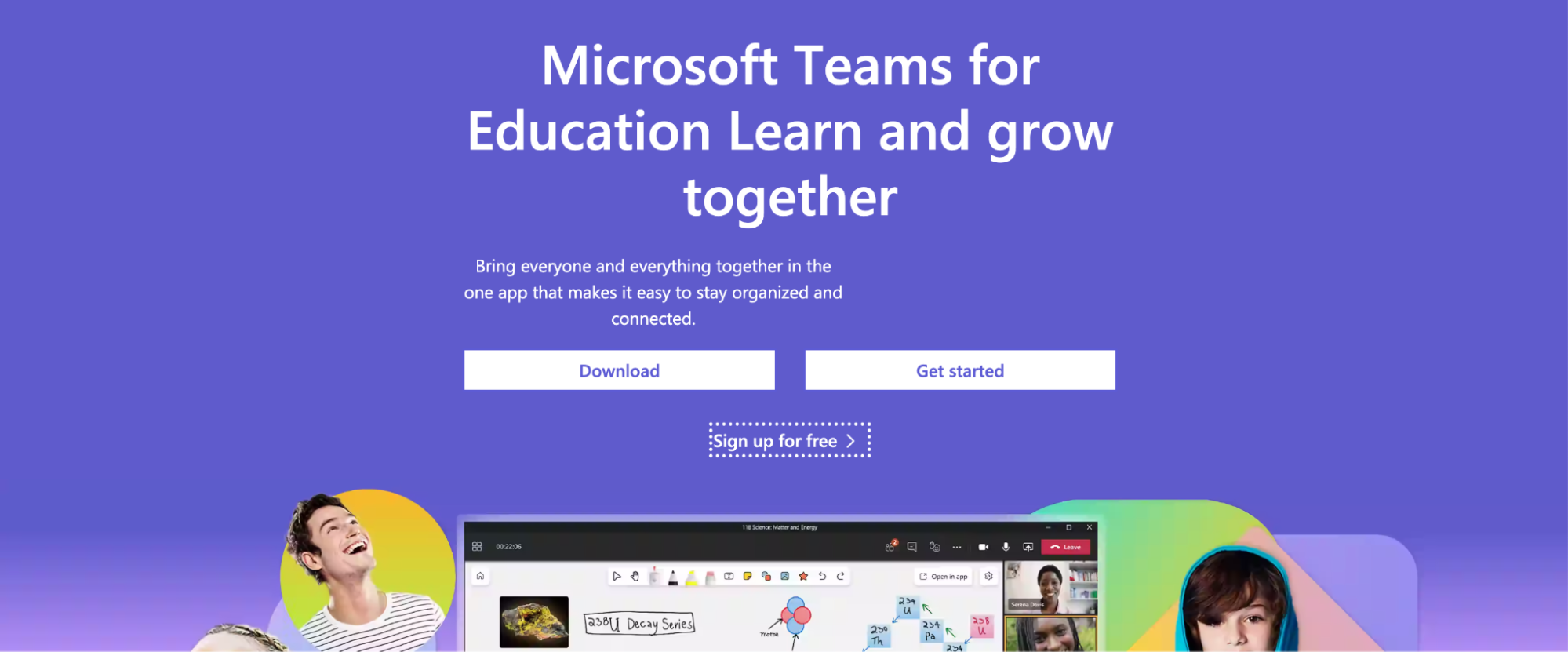
Microsoft Teams has established itself as a trustworthy web conferencing solution. The education version offers various learning-centered tools, integration options with educational apps, and collaborative workspaces for both participants and teachers.
While it easily integrates with many LMSs, Microsoft Teams also offers a few LMS-like features, such as giving students access to class materials, notes, and calendars.
It’s perfect for group discussions as well as individual chats. And, of course, if you often use other Microsoft products, like Word and PowerPoint, you’ll be happy to know they work seamlessly with Teams, which is a nice bonus.
Key features
- Class Sessions: Manage discussions with breakout rooms, record classes, and use live captions to enhance accessibility.
- Learning Tools: Share websites and class materials, create assignments, and collaborate on shared content.
- Analytics and Reporting: Monitor your learners’ success with detailed insights into their assignments and study progress.
- Emotional Check: Use polls and quick questions to get students’ feedback on how they are feeling, and make sure their emotional needs are met.
- Integration: Microsoft Teams supports multiple authoring tools for elearning, like Quizlet, NearPod, or Prezi to make the learning experience richer and more interactive.
Type: Video Conferencing Software
Pricing: by request.
Wrapping up
Choosing the right eLearning authoring tools may seem like a daunting task, even if you are an experienced educator or an instructional designer. Nevertheless, with so much good software at your disposal, you will undoubtedly discover the perfect fit for your goals.

